Discover Top of the Morning
Top of the Morning

Top of the Morning
Author: Mint - HT Smartcast
Subscribed: 6,803Played: 46,805Subscribe
Share
Description
Top of the Morning is a daily podcast hosted by Nelson John, in which we bring you all the action from the global markets and the business world to kick-start your day on a well-informed note. This is a Mint production, brought to you by HT Smartcast
785 Episodes
Reverse
On today's episode: Italy hits Apple with a €98 million fine over App Tracking Transparency. Indian IT giants TCS, Infosys and Wipro pivot hard toward AI integration. India's 850,000 cooperatives face pressure to go digital. Smartwatches earn medical certifications for hypertension tracking. And the India Oman trade deal opens new doors amid global tariff pressures.
Learn more about your ad choices. Visit megaphone.fm/adchoices
This week: Indian Railways announces its second fare hike of the year, adding 10 to 28 rupees on long-distance trips. India's capital formation slumps to a decade low as households pour money into gold instead of productive investments. IndiaRF looks to exit Synthimed Labs at a billion-dollar valuation. Defence and aerospace startups like Skyroot are now competing with Big Tech for IIT engineers. And in St. Petersburg, 17 Indians including a former software developer are cleaning streets, earning 1.1 lakh rupees a month in a country desperate for labour.
Learn more about your ad choices. Visit megaphone.fm/adchoices
The rupee's slide past 90 is hitting travellers beyond just US-bound trips. IndiGo's flight chaos reveals a pattern of reactive governance. TRAI proposes slashing backhaul spectrum charges. The $70 billion data centre rush runs into resource constraints. And record-low inflation might not be the good news it appears. What connects them? Systems under stress.
Learn more about your ad choices. Visit megaphone.fm/adchoices
AI stocks now make up 30% of the S&P 500 is a bubble brewing? India's burnout crisis hits Parliament with the Right to Disconnect Bill. RBI slams the door on stablecoins and bets on the Digital Rupee. Netflix makes an $83 billion play for Warner Bros that could reshape India's streaming wars. Plus, Acko preps for a blockbuster IPO. Five stories shaping money, markets, and policy all in one episode.
Learn more about your ad choices. Visit megaphone.fm/adchoices
Welcome to Top Of The Morning. I'm Nelson John.
In this episode, we explore how India's UPI has become the world's largest real-time payment system, processing more daily transactions than Visa globally. We break down Mexico's new 50% tariffs threatening nearly $2 billion in Indian auto exports. We follow the story of how Prada turned a cultural appropriation controversy into an $800 collaboration with Indian artisans. We examine Amazon's massive $75 billion commitment to India across e-commerce, cloud, and quick commerce. And we unpack Disney's surprising $1 billion investment in OpenAI that brings Mickey Mouse to AI video generation.
From street-level payments to billion-dollar boardroom deals, this episode connects the dots on how money, trade, and technology are reshaping business across the globe.
Learn more about your ad choices. Visit megaphone.fm/adchoices
Good Morning, I'm Nelson John..
In this episode, we unpack five major developments reshaping India's economic and trade landscape. We start with the government's exploration of higher ethanol blends beyond E20, including E23 and E27, and why the auto industry is pushing for flex-fuel vehicles instead. Then we examine the US-India trade negotiations happening under the shadow of a Supreme Court case that could invalidate Trump's tariffs entirely. We break down TCS's $700 million acquisition of Coastal Cloud and what it signals about the future of India's largest IT services company. Next, we look at the Trump Gold Card visa programme that's now accepting applications, offering US residency for $1 million. Finally, we analyse how India's export diversification strategy is paying off despite steep US tariffs, with China, Spain, and Russia emerging as growing markets.
Learn more about your ad choices. Visit megaphone.fm/adchoices
Welcome to Top of the Morning, I'm Nelson John.
Peak XV's Meesho IPO success. AI's enterprise determinism problem. Adani's 15,000 crore bankruptcy play. RCB's $2 billion sale question. China's eight-month manufacturing slump. Five stories that show how money, technology, and power are being repositioned globally.
Learn more about your ad choices. Visit megaphone.fm/adchoices
Good Morning, I'm Nelson John.. This week on Top of the Morning: SEBI delivers its biggest finfluencer crackdown, ordering Avadhut Sathe and his trading academy to return ₹546 crore in "unlawful gains." IndiGo's pilot shortage cancels 3,600+ flights and exposes years of staffing decisions. Putin visits Delhi amid US tariffs and sanctions, signing 16 agreements as India maintains its strategic balancing act. Wakefit opens its ₹1,289 crore IPO, asking public markets to validate a premium valuation. And Indian VCs bet big on consumer AI startups from Kuku FM to Dashverse. Five stories, one theme: accountability.
Learn more about your ad choices. Visit megaphone.fm/adchoices
Welcome to Top Of The Morning, Im Nelson John
Today,
India’s workplaces, industries, and digital systems are all shifting at once. Gen Alpha is rewriting the rules of work before they’ve even entered the workforce — expecting hybrid setups, AI partners, VR meetings, and shorter weeks. In the market, BYD’s rapid rise in EV sales shows how fast global players are reshaping India’s electric future. At the same time, India’s new data protection law is tightening consent and compliance, forcing companies to rethink how they collect and move data. Streaming platforms are also adapting, moving from subscriber counts to watch-time and engagement as budgets tighten and ad-supported models grow. And in the corporate world, Tata Communications’ move to acquire 51% of AI platform Commotion highlights how Indian firms are racing to build smarter, automated customer experiences. Together, these shifts tell the same story — technology, regulation, and consumer behaviour are rewriting how India works, watches, moves, and interacts.
Learn more about your ad choices. Visit megaphone.fm/adchoices
A JetBlue flight suddenly drops altitude. Investigation reveals: solar radiation corrupted flight control data. The result? The largest mass recall in Airbus history, with 6,000 jets grounded worldwide. Meanwhile, British Airways announces major India expansion, adding a third daily Delhi-London flight. India's DoT mandates that WhatsApp and Telegram must link to active SIM cards. And PM Modi's Mann Ki Baat celebrates 8.2% GDP growth and record 357 million tonnes of food grain production. Systems everywhere are being recalibrated.
Learn more about your ad choices. Visit megaphone.fm/adchoices
Welcome to Top of The Morning, I'm Nelson John.
Today,
Canada's immigration dream turns into a 10 year wait. China's pharma grip tightens. Mahindra bets big on electric SUVs. Indian unions strike. The tax net widens. Five stories about systems under pressure and what happens when the rules change.
Learn more about your ad choices. Visit megaphone.fm/adchoices
Welcome to Top of The Morning, I'm Nelson John..
What's something really worth? This episode explores the price of ambition from Wall Street's growing panic over a $5 trillion AI bubble, to Tesla opening its first all-in-one centre in Gurugram, India's ₹7,280 crore bet on rare earth magnets after China nearly shut down our EV industry, UPI's historic linkage with Europe's payments system, and a Haryana number plate that sold for ₹1.17 crore. Five stories, one question: Are we building the future or overpaying for it?
Learn more about your ad choices. Visit megaphone.fm/adchoices
Welcome to Top of the Morning, I'm Nelson John.
Today
America puts a price tag on citizenship, India-Canada restart trade talks, China's air got clean while India's didn't, nuclear power opens to private players, and AI transforms farming. Five stories, one theme: execution beats intention
Learn more about your ad choices. Visit megaphone.fm/adchoices
I'm Nelson John. Welcome to "Top of The Morning" by Mint.
Five stories, one theme: strategic inflection points. India launches a comprehensive plan to combat antibiotic resistance threatening millions of lives globally. Fluence Energy bets on India as supply chains shift away from concentrated manufacturing bases. India implements its biggest labour reform since Independence, overhauling 29 colonial-era laws amid union opposition. Canadian PM Carney secures major investment deals at a Trump-boycotted G20, signaling a fundamental realignment in global partnerships. And CoinDCX, India's first crypto unicorn, faces existential challenges after spectacular boom and bust. Systems under pressure, old models breaking down, and the scramble to build what comes next.
Learn more about your ad choices. Visit megaphone.fm/adchoices
Welcome to Top Of The Morning, I'm Nelson John.
India launches biometric e-passports, faces pressure to extradite Bangladesh's ex-PM, debates a billionaire's 72-hour workweek proposal, explores Russian shipbuilding partnerships, and gets Google AI localized. Five stories revealing how India's rebuilding infrastructure—both physical and digital—for global competition.
Learn more about your ad choices. Visit megaphone.fm/adchoices
Welcome to Top Of The Morning, I'm Nelson John.
Today's Top of the Morning: WhatsApp finally brings multi-account to iPhone (2 years late), Russia offers India unrestricted Su-57 tech transfer, Indian Railways heads for record ₹2.76T budget, and half of young American men are gambling. Four stories about big bets.
Learn more about your ad choices. Visit megaphone.fm/adchoices
Welcome to Top of The Morning with me Nelson John.
Today: NHAI raises ₹46,000 crore through highway InvITs attracting global investors, BIS overhauls cybersecurity and wind energy standards, ED attaches more RCom properties amid ₹40,000 crore fraud probe, Delhi's air pollution crisis kills 1.72 million Indians annually per Lancet study, and the US approves $93 million defense deal for Javelin missiles and Excalibur rounds.
Learn more about your ad choices. Visit megaphone.fm/adchoices
Happy Monday! Welcome to Top of The Morning, I'm Nelson John.
Today: Byju's gets carved up in bankruptcy court, India ditches cash for UPI, Trump's investment conflicts deepen, American voters inadvertently save Indian exporters, and India plays both superpowers while maintaining strategic autonomy.
Learn more about your ad choices. Visit megaphone.fm/adchoices
Welcome to Top Of The Morning, I'm your host Nelson John.
In today's Top of the Morning, we dissect five major developments that illuminate the complexities of Asian economic transformation. We begin with India's latest anti-dumping duties on Vietnamese steel products, exploring how importers are already circumventing the $121.50/tonne levy by importing semi-finished products instead – highlighting the cat-and-mouse game between policymakers and market players.
The arrest of Jaypee Infratech's former MD Manoj Gaur by the Enforcement Directorate brings into sharp focus the governance challenges in India's real estate sector, with ₹14,599 crore allegedly diverted from homebuyers to unrelated entities.
Learn more about your ad choices. Visit megaphone.fm/adchoices
Good Morning, I'm Nelson John
New episode explores five interconnected stories reshaping global business: from H-1B policy reversals to Pakistan's governance transformation to India's infrastructure revolution. The boundaries between tech and traditional industry are dissolving faster than ever.
Learn more about your ad choices. Visit megaphone.fm/adchoices



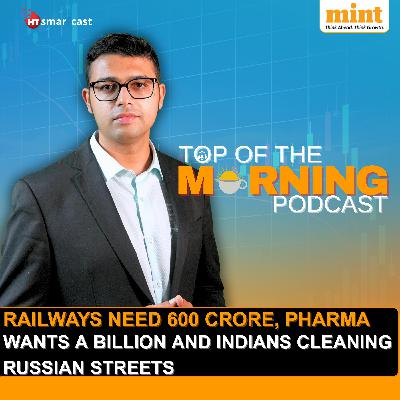


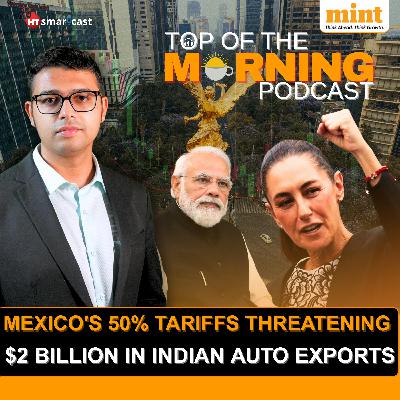
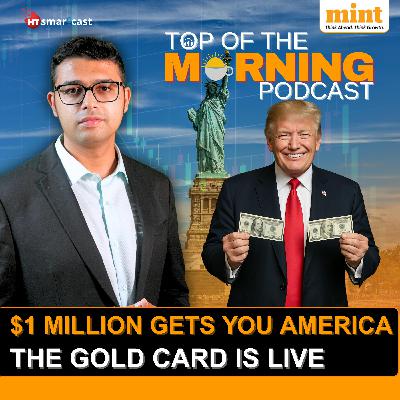
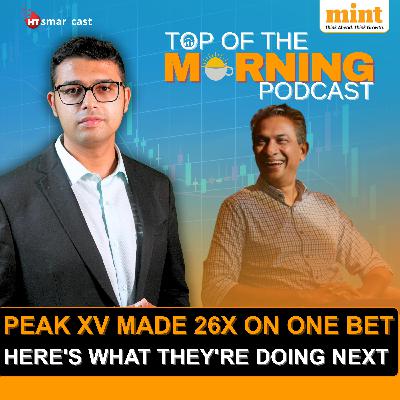
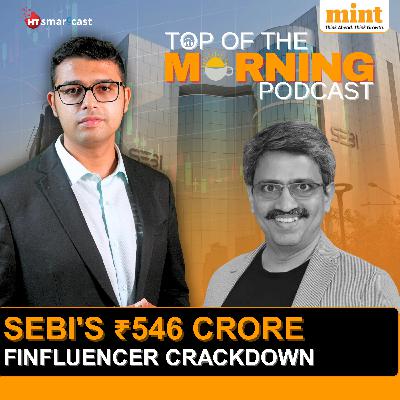
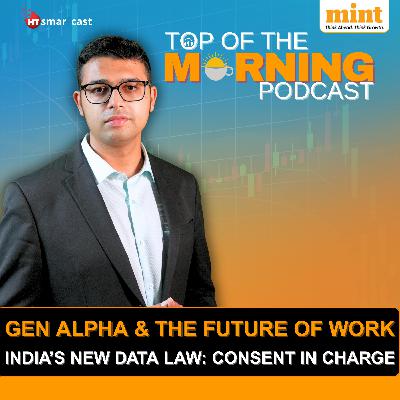



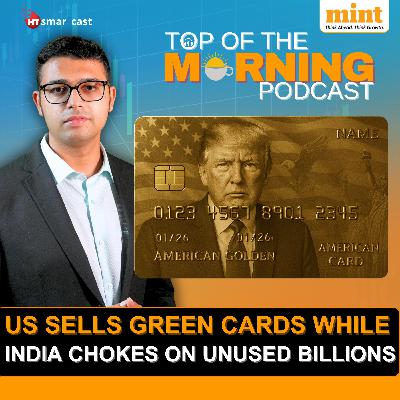
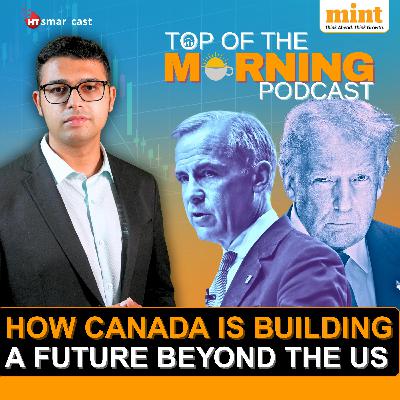
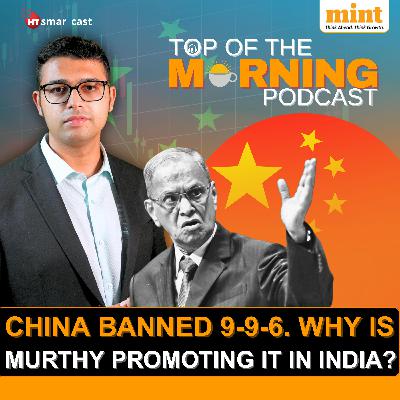


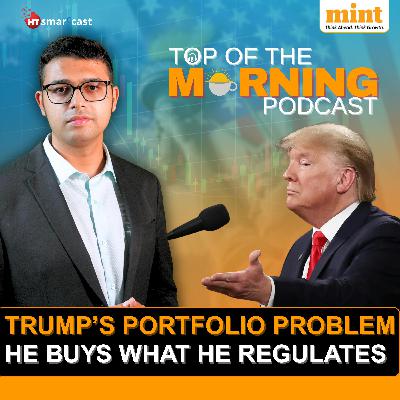

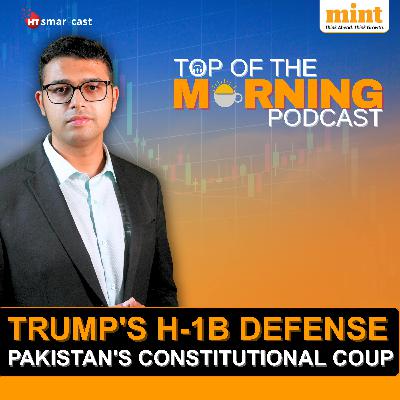



This is a very well produced newscast, and maintains that consistent quality and structure day after day! Not to forget, Nelson John is an absolutely top notch narrator. Great job, folks!